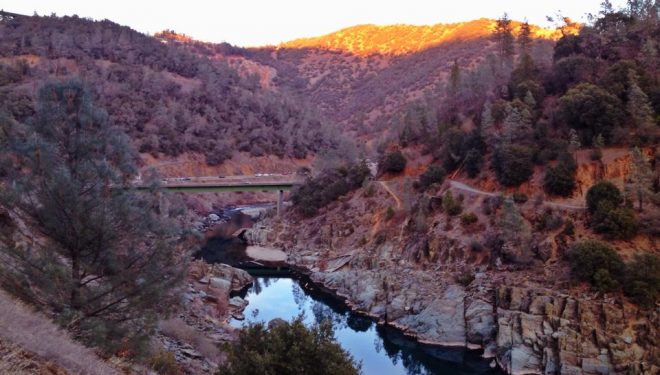
By Miles Krieger and Steven Anderson
In April 2021, the Ninth Circuit Court of Appeals reversed a U.S. District Court ruling dismissing a breach of trust claim by the Navajo Nation (Nation) against the Department and Secretary of the Interior (Interior), the U.S. Bureau of Reclamation (Bureau), and the U.S. Bureau of Indian Affairs (BIA). The Nation’s complaint alleged that the various federal agencies breached their fiduciary duty to the Nation by failing to consider the Nation’s unquantified water rights in the management of the Colorado River. [Navajo Nation v. U.S. Department of the Interior, ___F.3d___, Case No. 19-17088 (9th Cir. Apr. 28, 2021).]
Background
The Navajo Nation is a federally recognized tribe whose reservation includes portions of Arizona, New Mexico, and Utah. The Nation’s reservation was established by treaty in 1868, and was later expanded by executive orders and acts of Congress. The Colorado River defines part of the Reservation’s western border.
The Colorado River is governed by an array of laws known as the “Law of the River.” A 1922 compact, conditionally approved through the Boulder Canyon Project Act in 1928, divides the Colorado River basin into an Upper and Lower Basin, consisting of Colorado, New Mexico, Utah, and Wyoming in the Upper Basin, and Arizona, California, and Nevada in the Lower Basin. Each Basin is apportioned 7.5 million acre-feet of water per year. A 1964 decree by the United States Supreme Court adjudicated water rights in the Colorado River, including for five Indian Tribes to the mainstem of the Colorado River. The Decree did not, however, adjudicate the rights of the Navajo Nation to the mainstem of the Colorado River or its tributaries.
Each year, the Department of the Interior determines whether there will be a surplus or shortage of water in the Lower Basin. In 2001 and 2007, Interior adopted guidelines to clarify how it determines the existence of a shortage or surplus. Interior’s final environmental impact statement prepared prior to Interior’s adoption of the 2001 guidelines identified the Nation’s unquantified water rights as Indian trust assets.
In 2003, the Nation challenged Interior’s 2001 surplus guidelines, alleging that its approval of the guidelines violated the National Environmental Policy Act (NEPA) and breached the federal government’s trust obligations to the Nation in the management of the Colorado River. In particular, the Nation alleged that Interior, the Bureau, and the BIA (collectively: Federal Agencies) failed to consider or meet the Nation’s unquantified water rights and water needs on the reservation. The District Court dismissed the Nation’s complaint on the grounds that the Nation lacked Article III standing to bring its NEPA claim and that sovereign immunity barred the Nation’s breach of trust claim. The Ninth Circuit affirmed in part and reversed in part, remanding the breach of trust claim to the district court for full consideration of the merits of that claim, including as the Nation may seek to amend it.
The Ninth Circuit’s Decision
The Nation sought to amend its complaint twice, with the third amended complaint alleging that the Federal Agencies failed to: 1) determine the quantities and sources of water required to make the Nation a permanent homeland for the Navajo people, and 2) protect the sovereign interests of the Nation by securing an adequate water supply to meet those homeland purposes. The District Court denied both motions to amend and dismissed the Nation’s complaint with prejudice on the grounds that the Nation failed to identify a specific trust-creating statute, regulation or other law that the Federal Agencies violated, and that a determination of any water rights to the mainstem of the Colorado River under the Winters doctrine was jurisdictionally barred by the Supreme Court’s reservation of jurisdiction under the Decree. The Ninth Circuit reversed, holding that the Nation’s breach of trust claim did not implicate the Supreme Court’s reservation of jurisdiction in the Decree and that the Winters doctrine establishes an enforceable trust duty.
Jurisdiction
With respect to the jurisdictional question, the Ninth Circuit held that the Nation’s complaint did not seek a quantification of its rights in the Colorado River. Instead, the Nation sought an injunction requiring the Federal Agencies to determine the extent to which the Nation requires water, to develop a plan to secure the water needed, to exercise authority to manage the Colorado River in a manner that does not interfere with the plan to secure the water needed, and to require the Federal Agencies to analyze and mitigate any adverse effects of those actions. In effect, the Nation sought a judicial order requiring the Federal Agencies, as opposed to the court, to determine the appropriate quantity of water necessary to satisfy the water needs of the Nation as a homeland for the Navajo, and to account for those needs in the shortage guidelines. According to the Ninth Circuit, granting the Nation’s requested relief would not require a judicial quantification of the Nation’s rights to water in the Colorado River, and therefore fell outside the scope of the Decree. Similarly, because the Ninth Circuit determined that the Nation’s breach of trust claim was not a claim seeking judicial quantification of its water rights, the Ninth Circuit held that the Nation’s claim was not barred by res judicata as a claim that could have been adjudicated in the Decree, as argued by intervener states and agencies.
The Ability to Amend the Complaint
With respect to whether the Nation could plead a substantive breach of trust claim, the Ninth Circuit held that the Nation identified specific treaty, statutory, and regulatory provisions that impose fiduciary obligations on the Federal Agencies by basing its claim on the Nation’s unquantified water rights that were impliedly created when the Nation’s reservation was created as a homeland for the Navajo people. Thus, the Ninth Circuit concluded that the District Court should have allowed the Nation to amend its complaint.
As explained by the Ninth Circuit, under the Winters doctrine the federal government reserves appurtenant, unappropriated water necessary to accomplish the purpose of a reservation if the treaty (in this instance) creating the reservation is silent about water. The Ninth Circuit observed that the 1868 treaty creating the Nation’s reservation contemplated farming by members of the reservation, thus encouraging a transition to agrarian society. Accordingly, the creation of the Nation’s reservation impliedly reserved water for the purpose for which it was created, which included farming. Moreover, the Ninth Circuit observed that the Federal Agencies exercised pervasive control over the Colorado River under the Law of the River, and that Interior’s guidelines expressly recognized unquantified Winters rights as Indian Trust Assets. The Ninth Circuit therefore held that the Nation had identified a specific duty to protect and preserve the Nation’s right to water. The Ninth Circuit also noted that the long-standing, unquantified nature of the Nation’s reserved water right was due to the federal government having never sought to quantify those rights, and the Nation should not be prevented from doing so as a result. Accordingly, the Ninth Circuit held that the Nation should have been allowed to amend its complaint, and that doing so would not be futile.
Conclusion and Implications
While the Ninth Circuit’s holding appears to be limited to allowing the Nation to amend its complaint to substantiate its breach of trust claim against the Federal Agencies, the Ninth Circuit’s reasoning in reaching that decision may have broader implications for the role unquantified Winters rights may play in federal and even state policy governing the management of water resources. The Ninth Circuit’s opinion also introduces the prospect of non-judicial quantifications of federally reserved rights through federal water management efforts as a consequence of federal trust duties to tribes and tribal assets, such as water rights. The Ninth Circuit’s opinion of April 28, 2021 is available online at: https://cdn.ca9.uscourts.gov/datastore/opinions/2021/04/28/19-17088.pdf




